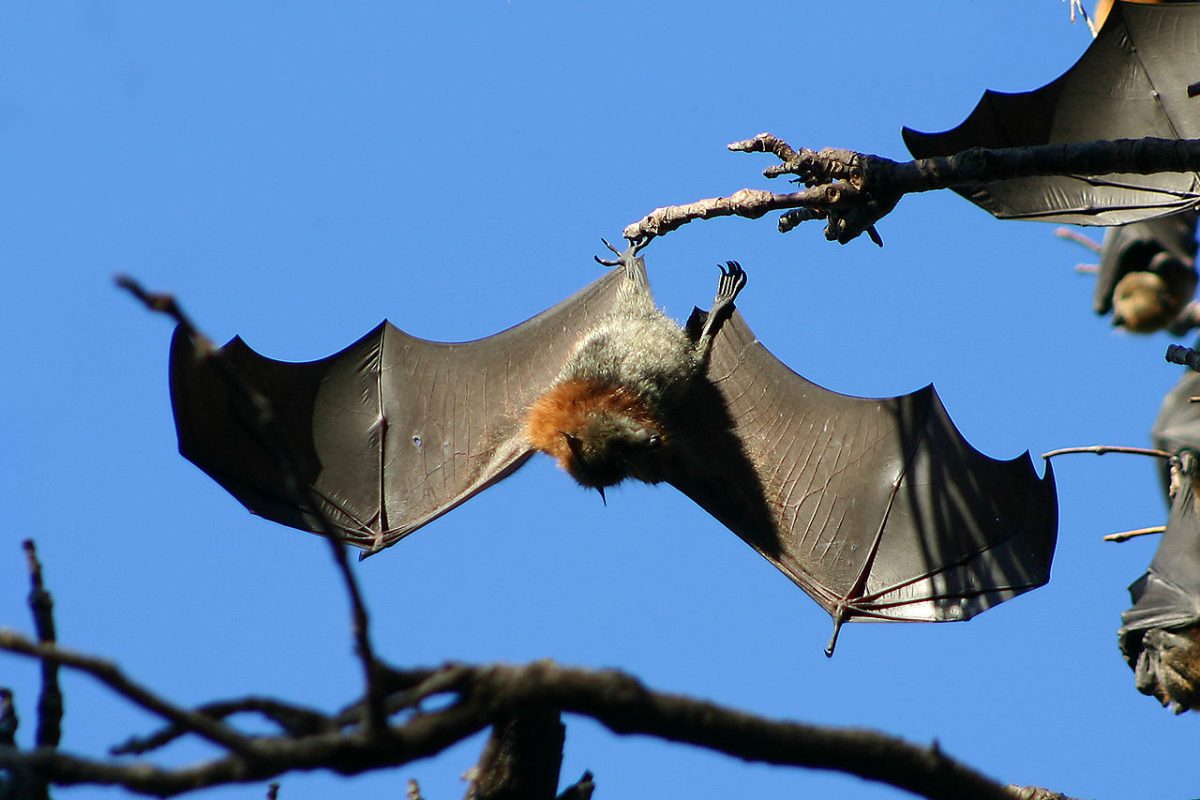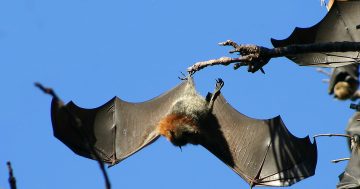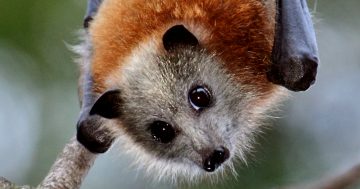
Grey-headed flying foxes are feasting on flowering eucalypts in Eurobodalla. Photo: Eurobodalla Council.
Eurobodalla Council is offering support to residents impacted by an influx of grey-headed flying foxes.
While the megabats are crucial in keeping forests healthy, an inundation to the area following several hard years is impacting people’s lives.
Eurobodalla Shire Council says there are about 18,900 flying foxes shire-wide, with about 12,000 at the Catalina golf course and 6000 at the Batemans Bay Water Gardens, as well as camps at Moruya Heads, Tuross and Narooma.
Numbers are expected to drop as the weather cools, with populations typically peaking from December to April.
Flying foxes play an important role in dispersing seeds and pollinating flowering plants and are crucial to keeping native forests healthy according to trained carer licensed with Wildlife Rescue South Coast, Trista Kyriacou.
“Camp numbers have been affected in our region since the bushfires,” she says.
“It has been reported that the South Coast of NSW lost 49 per cent of rainforest canopy in the 2019/20 bushfires, which has severely impacted food and habitat for the grey-headed flying fox.”
She says before this year’s heavy rain, South Coast camp numbers had increased as there was adequate blossom in the area for the first time in two years.
However, after the rain what little blossom the region had was washed out.
“At the beginning of April, we saw a high mortality rate in Shoalhaven camps, with hundreds of calls from the public to report deceased animals on the ground or in trees,” Ms Kyriacou says.
“Shoalhaven camp numbers have dropped in the last week due to food shortage and the Eurobodalla numbers have increased, indicating the flying foxes are in search of food and their winter camps.
“Normally we would see them head north to warmer climates this time of the year.”
Council’s flying fox officer Natalie Foster says council is monitoring Eurobodalla’s flying fox population closely and offering residents who live near flying-fox camps help with free Cocos palm removal, odour neutralisation pots and loans of water pressure cleaners.
“It’s a recurring phenomenon that has a large impact on people’s lives, especially the residents near the bats,” Batemans Bay Business and Tourism Chamber president David Maclachlan says.
“It affects their health, their property and their way of life.
“I don’t know anyone who wants to live with them, but I understand that a lot of people don’t want them exterminated and they are concerned from an animal rights point of view.”
He welcomes council’s offer of support.
“I think it’s fantastic; it’s great the council recognises the effect those bats are having on people,” Mr Maclachlan says.
Council has so far removed 131 Cocos palms in the Batemans Bay region and plans to remove around 150 more and replace them with suitable native trees.
The palms are an introduced species and cause many health problems for flying-foxes. Their feeding at night in a palm is noisy, messy and the fruit can make the flying-fox droppings stickier and more difficult to remove.
Ms Kyriacou says people should never touch flying foxes or bats as they would have to be vaccinated against the Australian bat lyssavirus, a fatal virus that can be contracted from an infected bat through a bite or scratch.
“There is no risk if bats are living nearby or by faeces,” she says.
“We do not encourage the public to feed bats as this puts them at risk of coming into contact with people, pets, predators, barbed wire or fruit tree netting.
“One way you can help is by removing the berries off Cocos palm trees to reduce risk of toxicity poisoning and consider sharing your excess fruit on fruit trees by removing fruit tree netting during times of food shortages.”
She says if flying foxes or bats are seen alone during the day or low to the ground, they are in need of help and encourages people to call Wildlife Rescue so a vaccinated and trained rescuer can attend.
If you are north of Batemans Bay call 0418 427 214 and if you are south of the Bay to the Victorian border call 0417 238 921.
For information on the Cocos removal program, contact Ms Foster on 4474 7329 or [email protected].
The Batemans Bay Depot loans out odour neutralisation pots and water pressure cleaners.









